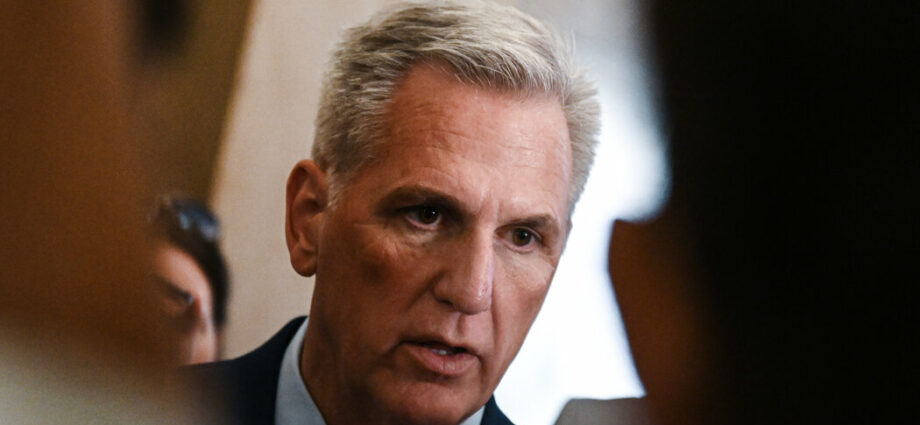House Speaker Kevin McCarthy said this week that he did not believe Republicans and Democrats were anywhere close to a deal on raising the debt ceiling. President Biden said little in public. As the risk of default drew closer, Republicans got together and auctioned off a tube of used cherry lip balm, which sold for six figures.
Welcome to the latest week of “productive” negotiations in Washington, a town that has an entire glossary — cliffs and ceilings and X-dates — of shorthand for its periodic dance with ticking financial time bombs.
“Nothing forces Washington’s hands like a deadline,” said Eric Schultz, a former deputy White House press secretary under President Barack Obama.
In recent days, talks have started and stopped and started again as Mr. Biden, Mr. McCarthy and their teams of negotiators worked to discuss a plan. So far, there are few specifics: “We both agree we want to be able to come to an agreement,” Mr. McCarthy told reporters on Monday after leaving his White House meeting with the president.
Both men seem intent on preventing their relationship from sliding into scorched-earth territory, though they remain far apart on the particulars of striking a deal by June 1, when the Treasury has indicated the government may run out of money to pay its bills.
That’s one week away — practically an eternity by Washington-saga standards.
And lest anyone think the lack of a breakthrough was a sign of intransigence or dawdling or typical government dysfunction, both sides insisted that everyone involved agreed that they wanted to agree. In a divided Washington, this is what passes for progress.
Mr. McCarthy said the meeting with the president had been “productive.” Not only that, it had been “better than any other time we’ve had discussions.”
Mr. Biden, in a brief statement after the meeting, also used the word “productive.” Nothing had changed by the next afternoon, when the White House press secretary, Karine Jean-Pierre, would repeat it yet again: “The meeting that the president had with the speaker yesterday was indeed productive,” she affirmed.
Senator Mitch McConnell, the minority leader, who has shown little willingness to join in on the productivity, weighed in from his home state of Kentucky: “Everybody needs to relax,” he told reporters.
“The last 10 times we raised the debt ceiling, there were things attached to it,” he said, referring to concessions or compromises that are usually — but not always — agreed to. “This is not that unusual. It is almost entirely required when you have divided government.”
According to the White House, this was not a very productive thing to say.
“What’s unusual is for our economy and the American economy to be held hostage and to be connected in this way to the budget process,” Ms. Jean-Pierre commented from the briefing-room podium.
Perhaps these conversations actually are productive, compared with past president-speaker relationships. (President Donald J. Trump once called Speaker Nancy Pelosi a “third-grade” politician during a meeting at the White House in 2019. It ended soon afterward.)
But are they normal?
Sort of, according to William Howell, a professor at the University of Chicago Harris School of Public Policy.
“It’s normal in the sense that it’s familiar, but it’s not normal in the sense that it’s especially healthy or in keeping with how other countries attend to their debt obligations,” he said.
Outside of Washington, Americans have signaled that they would like both Republicans and Democrats to make progress in other ways. On Tuesday, CNN published a poll that said that, while a majority of Americans supported raising the debt limit, only 31 percent thought Mr. Biden had the right priorities, and 29 percent thought Republicans did.
Nevermind that. Debt-ceiling productivity continued throughout the day on Tuesday, even as members of the restive right flank of the Republican Party, which Mr. McCarthy will have to pacify in order to strike a deal, let it be known that they were in no particular hurry.
When a reporter from Semafor asked Representative Matt Gaetz, Republican of Florida, about the talks, he replied that he and his fellow conservative colleagues “don’t feel like we should negotiate with our hostage.”
It was unclear whether Mr. Gaetz was talking about the president or the federal government.
On Tuesday, Politico reported that Representative Marjorie Taylor Greene of Georgia bid $100,000 to buy a tube of Mr. McCarthy’s used lip balm at a Republican fund-raising auction.
The high-dollar purchase drew public outrage from Democratic lawmakers who accused them of frivolous behavior as the country hurtled toward default.
“Spending $100,000 on chapstick while working overtime to gut the programs that working families rely on. GOP priorities in a nutshell,” Representative Nydia Velazquez of New York said on Twitter.
Allies of Mr. Biden say they believe real, tangible progress could take place when one of two things happen: the financial markets begin to put pressure on Republicans, as they did in 2011, or the holiday weekend beckons.
“Nothing motivates Congress like the smell of jet fumes as we get close to the weekends,” said Dan Pfeiffer, a former senior adviser to Mr. Obama who was at the White House during painful debt-ceiling negotiations in 2011 and 2013.
“So we’ll see what happens in a couple days.”
Aishvarya Kavi contributed reporting.
Katie Rogers is a White House correspondent, covering life in the Biden administration, Washington culture and domestic policy. She joined The Times in 2014. @katierogers
Source: Read Full Article
-
Rishi Sunak’s central election promise is in jeopardy, warns top economist
-
Northern Ireland facing chaos after midnight deadline
-
Dowden gets UK ‘ready’ against Russia’s grip on the global gas market
-
Eco group boast of meetings with Labour officials after Starmer speech protest
-
Bar owner accuses treasury of killing the British Spirits industry

